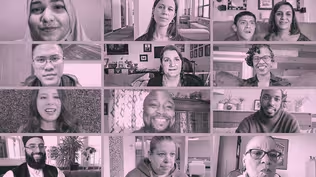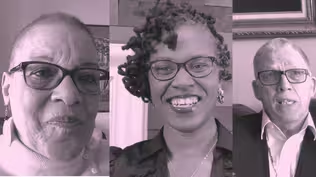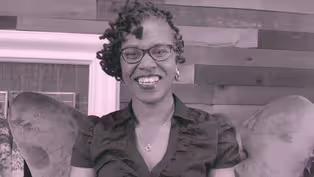
Idris Mitchell | Decolonizing Mental Health
Special | 5m 5sVideo has Closed Captions
How Idris Mitchell’s bipolar disorder put him in an eternal pursuit of beauty and joy.
Idris Mitchell did everything there was to do on the Yale campus, until a diagnosis of bipolar disorder made him miss his finals, lose the perfect 4.0 and feel invisible. What does success mean to a Black queer man who had to be kept away from his pens? How does he turn around and adapt to a constant process of grieving for his previous self, while always being in pursuit of beauty and joy?
Problems playing video? | Closed Captioning Feedback
Problems playing video? | Closed Captioning Feedback
Funding for Mysteries of Mental Illness is provided by the Corporation for Public Broadcasting, Johnson & Johnson, the American Psychiatric Association Foundation, and Draper, and through the support of PBS...

Idris Mitchell | Decolonizing Mental Health
Special | 5m 5sVideo has Closed Captions
Idris Mitchell did everything there was to do on the Yale campus, until a diagnosis of bipolar disorder made him miss his finals, lose the perfect 4.0 and feel invisible. What does success mean to a Black queer man who had to be kept away from his pens? How does he turn around and adapt to a constant process of grieving for his previous self, while always being in pursuit of beauty and joy?
Problems playing video? | Closed Captioning Feedback
How to Watch Mysteries of Mental Illness
Mysteries of Mental Illness is available to stream on pbs.org and the free PBS App, available on iPhone, Apple TV, Android TV, Android smartphones, Amazon Fire TV, Amazon Fire Tablet, Roku, Samsung Smart TV, and Vizio.

Join the Campaign
Share your story of dealing with mental illness through textual commentary, a still image, a short-form video — however you feel most comfortable — using the hashtag #MentalHealthPBS on social media.More from This Collection
The Decolonizing Mental Health series dismantles the racism that underscores the mental healthcare industry. By focusing its gaze on the transformative work of therapists and individuals of color, it calls for redressal of the ways in which we define psychiatric illness and health.
Shawna Murray-Browne | Decolonizing Mental Health
Video has Closed Captions
Shawna Murray-Browne’s quest to help BIPOC access ways of nurture, care, and healing. (4m 24s)
Lloyd Hale | Part 2 | Decolonizing Mental Health
Video has Closed Captions
Lloyd Hale’s journey from being a convict to a peer support specialist living in recovery. (6m 1s)
Lloyd Hale | Part 1 | Decolonizing Mental Health
Video has Closed Captions
Lloyd Hale’s story of teenage schizophrenia and the lack of mental health support. (4m 46s)
Providing Support for PBS.org
Learn Moreabout PBS online sponsorship(peaceful music) - My name is Idris Sierra Mitchell Raised in the DMV, the DC, Maryland, Virginia area.
(soft music) My senior year of high school, right before my senior year I applied to one school, I don't know if I was confident, cocky or just excited about this one school but I applied to one school and I got into the school, so luckily it worked out.
(peaceful piano music) I got into Yale and I think upon arriving to Yale, there was a sense that, wow, you're visible, like, you've made it.
(soft music) I think I felt that I kind of rode out off of some really exciting moments.
There were protests, I was involved.
I felt like this is how I can start to take on leadership and make impact in the ways that I wanted to.
And so I come back off of that, I go into sophomore year ready to kind of continue the impact but that was kind of abruptly put on hold because I was diagnosed with bipolar disorder.
And that occurred after a series of manic episodes.
(soft music) Finals are about to happen, and I go into a series of, like, not sleeping feeling as though I have to help out.
There's a lot I have to do on campus.
That trips another set of manic episodes.
This one, much more, yeah, this one pretty heavy.
(soft music) My friends are worried, my roommate calls my mom That leads to a medical withdrawal from the, a hospitalization actually, and then it's institutionalization which may not be the most PC way but inpatient mental health care facility.
(soft music) I was in the hospital gowns.
And I was, unable to use pens because they were a danger to myself and I wasn't able to finish my finals and I was unable to maintain a 4.0 that semester.
Then, and retrospectively, I think I started to view that period as what is it to be rendered invisible?
(somber music) I was crushed.
I was beside myself.
There was a coming to terms with actually being bipolar, right, not believing it, not understanding it.
And it took some time.
I think there's a sense of self that is lost, right?
There's a grief for that old self that must go through and that process, like grieving a person who has actually left this earth it can take a year, it can take more.
(somber music) I think every manic episode I've ever had, every major kind of disruption was due because, or due to a lack of sleep.
And it starts with maybe one night you get five hours but then the next time you get four and then after that it's three and then you find yourself in a hypomanic to manic state.
(somber music) And so that led me to being hospitalized in the beginning of February after about three days or so, of not really sleeping properly.
And so that was something, cause that's, this is five years later, I'm preparing for all the things, I'm preparing for a potential move for my career, writing this book, I'm doing all these things that like... and to find yourself five years later in a hospital same gowns of sorts going to the same occupational therapy, it was humbling.
This time around, I think it was necessary, necessary to recognize that while I had been worrying about my care and my mental health and wellness in many ways, I wasn't holistically looking at it and saying, "All right, you've accepted you're bipolar but have you accepted all the various things that that means of how you're going to operate?"
I feel as though there's a culture of not only surviving but thriving.
To people, to doubt your ability and capacity for greatness, for beauty, for joy.
That fact that people may doubt it regardless, may doubt my positionality as a Black queer man is, is true.
(somber music) I think there are a lot of ways in which I seek to manage my mental health.
Some, it's a constant process.
It's a constant learning and it's a constant growing.
So the ways that work now may work for this season but may not work maybe five years from now.
Sometimes mental illness is treated in so many different ways beyond a biological chemical reaction.
There's so many other ways people view this.
What will be important for mental health and wellness to kind of take center stage moving forward is understanding the need for support networks.
Biological, chosen, or otherwise.
(soft music)

- Science and Nature

Explore scientific discoveries on television's most acclaimed science documentary series.

- Science and Nature

Capturing the splendor of the natural world, from the African plains to the Antarctic ice.












Support for PBS provided by:
Funding for Mysteries of Mental Illness is provided by the Corporation for Public Broadcasting, Johnson & Johnson, the American Psychiatric Association Foundation, and Draper, and through the support of PBS...




